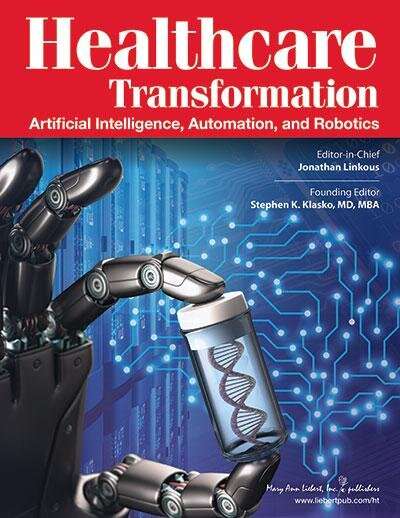How can healthcare achieve real technology driven transformation?

Real transformation in healthcare through the adoption of artificial intelligence (AI), robotics, telecommunications, and other advanced technologies could provide significant improvements in healthcare quality, productivity, and access. The current status and future challenges and opportunities for integrating technology into consumer healthcare are discussed in a series of research and opinion articles published in a preview issue of Healthcare Transformation: Artificial Intelligence, Automation, and Robotics, a new peer-reviewed journal from Mary Ann Liebert, Inc., publishers.
Technology such as AI, mobile apps, and wearables have impacted people in areas such as ride sharing, shopping, and entertainment. How can technologies such as these and telehealth, "which have transformed other areas of individuals, families, and communities' lives, give people the tools to take charge of their health, and to manage their sicknesses?" asks Sharon Terry, Genetic Alliance (Washington, DC) in her Guest Opinion entitled "People at the Center." She emphasizes the need to keep people and their needs at the center as healthcare transformation through technology continues to evolve.
Ateev Mehrotra, MD, MPH, Harvard Medical School (Boston, MA) and colleagues from Harvard, McLean Hospital (Boston), RAND Corp. (Arlington, VA), and Beth Israel Deaconess Medical Center (Boston) coauthored the article entitled "Characteristics of Organizations that Provide Telemental Health." Using a random sample of Medicare beneficiaries, they identified the organizations that billed the largest number of telemental health visits. They found that five telemedicine companies provided nearly half (48.3%) of the telemental health visits. Most of the remaining visits were provided by private health clinics (24.3%) and community health centers (14.5%).
The Perspective article "Artificial Intelligence: Lessons Learned from Radiology." by Elizabeth Krupinski, Ph.D., Emory University (Atlanta, GA), discusses how AI can help medicine in general, and radiology more specifically. She focuses on AI and computer-aided detection and diagnosis of disease, and how AI can optimize advanced scanning modalities such as CT and MRI. Dr. Krupinski also describes how radiologists perceive AI, presents key challenges and opportunities for applying AI, and discusses where to learn more about AI and radiology.
"Technology can, when used appropriately and embedded within other transformations, result in real, significant, and lasting improvements in access, quality, and efficiencies," states Jonathan D. Linkous, MPA, FATA, Editor-in-Chief Healthcare Transformation and Co-Founder and CEO of PATH. "Amassing data alone is not a solution.," he says. "Real transformation is the challenge Healthcare Transformation and PATH hope to achieve."
More information: Sharon F. Terry, People at the Center, Healthcare Transformation (2019). DOI: 10.1089/heat.2019.29050.ste


















